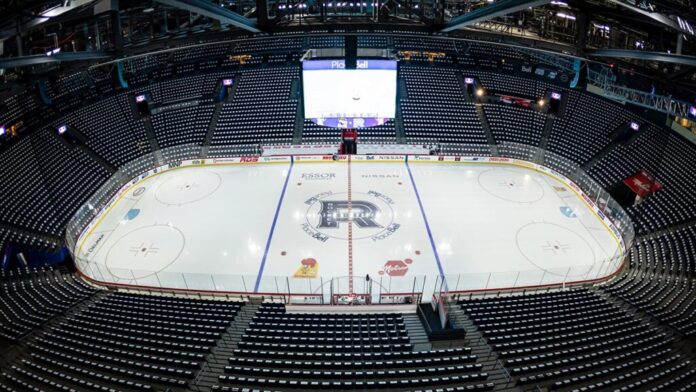Patrick Williams, TheAHL.com Features Writer
Two high-quality teams have run into the Laval Rocket this spring. Two high-quality teams have seen their seasons ended.
In the division semifinals, the Cleveland Monsters staged a valiant battle but fell in four games. In the division finals, the Rochester Americans, a 92-point team this season, dragged the Rocket the distance before falling in a series-deciding Game 5.
Next up is the Charlotte Checkers in the best-of-seven Eastern Conference Finals, with the winner advancing to play for the Calder Cup. Both teams play straight-line, aggressive, puck-hungry hockey. They hunt pucks relentlessly and ruthlessly. They’ll play physically, over and over, until an opponent has nothing left with which to counter. Laval has a potent power play. But Charlotte owns a penalty kill that not only can extricate the team out of trouble but also counter-strike for offense.
Start in net, where the Rocket have turned to both Cayden Primeau and Jacob Fowler this postseason. Primeau, who has been down this path before backstopping Laval to the conference finals in 2022, shut out Rochester in Game 5 on Sunday. Fowler struggled against the Amerks, but has been generally impressive since joining the Rocket from Boston College in April. The Checkers, meanwhile, counter with Kaapo Kähkönen, a late-season addition to the roster who has 140 games of NHL experience. Place Bell has gained notoriety for its loud, chaotic environment that can rattle both opponents and visiting goaltenders. But against Kähkönen and his ultra-calm, composed demeanor? That will take a steadfast effort from the Rocket.
Both teams possess strong blue lines. Laval has a pair of first-round picks in Logan Mailloux (31st overall in 2021) and David Reinbacher (fifth overall in 2023), while Adam Engström has emerged as a bona fide prospect in his first season in North America. Charlotte can offer Trevor Carrick, a Second AHL All-Star this season, and Matt Kiersted, who hopes to return soon from injury, to help solidify a younger group that includes Michael Benning, Tobias Bjornfot, Mikulas Hovorka and Marek Alscher.
And then there are the Laval forwards, starting with an elite playmaker in Alex Barré-Boulet and Laurent Dauphin. The Rocket also boast exceptional depth up front, with six 20-goal scorers in the regular season including rookie Florian Xhekaj and second-year pros Joshua Roy, Sean Farrell and Jared Davidson. Charlotte, a team that had to deal with a crush of injuries in the regular season, has gone with a strong base of balanced scoring. John Leonard, a 36-goal scorer in the regular season, has continued to provide offense in the playoffs. Rasmus Asplund has a team-high four goals. Justin Sourdif is dependable on both sides of the puck. Brett Chorske and Ben Steeves, both rookies, have adapted well to the demands of the Calder Cup Playoffs. Most of all, Checkers head coach Geordie Kinnear can roll his four forward lines with confidence, and any one of them can create disruptions for opponents.
Armed with a potent transition game, Charlotte possesses a relentless ability to slip behind opposing coverage and break loose. Moreover, the Checkers can do it without cheating for offense. They have allowed an AHL-best 23.0 shots per game in the postseason, leaving Providence and Hershey teams smothered and losing puck battles to the Checkers’ up-tempo, hungry approach modeled closely after the parent Florida Panthers.
“We always talk as a group [about] finding our game and do it over and over again,” Kinnear explained. “I think you look at it as a fun way to play. When you have fun playing hockey, you’re going to buy in pretty quick. So go out and play, skate, work, compete, and good things will happen, especially when you have guys that are in sync.”
Kinnear, who won the Calder Cup in 1995 as a hard-nosed young defenseman with the Albany River Rats, is also excited about what playing so deep into the Calder Cup Playoffs can mean for his players now and later in their careers. Little separates Charlotte and Laval in terms of talent. For both teams now, this series will test them mentally and emotionally as much as it will physically.
“I think I just look back at my career as a young professional first coming in,” Kinnear recounted, “I was soaking it all in, and became a better person, better player, better competitor. The toughness aspect of it is so critical.
“It only gets harder, and the compete level gets escalated. So we need to be mentally, physically tough. I think that’s a separator that we’ve talked about all year, and that allows you to be able to win.”

On the American Hockey League beat for two decades, TheAHL.com features writer Patrick Williams also currently covers the league for NHL.com and FloSports and is a regular contributor on SiriusXM NHL Network Radio. He was the recipient of the AHL’s James H. Ellery Memorial Award for his outstanding coverage of the league in 2016.





















